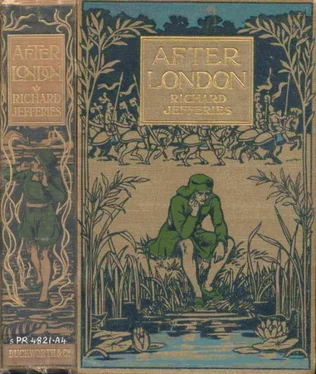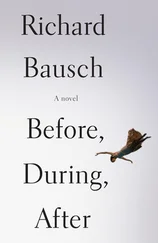Richard Jefferies - After London
Здесь есть возможность читать онлайн «Richard Jefferies - After London» весь текст электронной книги совершенно бесплатно (целиком полную версию без сокращений). В некоторых случаях можно слушать аудио, скачать через торрент в формате fb2 и присутствует краткое содержание. Город: London, Год выпуска: 1905, Издательство: Duckworth & Co., Жанр: sf_postapocalyptic, на английском языке. Описание произведения, (предисловие) а так же отзывы посетителей доступны на портале библиотеки ЛибКат.
- Название:After London
- Автор:
- Издательство:Duckworth & Co.
- Жанр:
- Год:1905
- Город:London
- ISBN:нет данных
- Рейтинг книги:4 / 5. Голосов: 1
-
Избранное:Добавить в избранное
- Отзывы:
-
Ваша оценка:
- 80
- 1
- 2
- 3
- 4
- 5
After London: краткое содержание, описание и аннотация
Предлагаем к чтению аннотацию, описание, краткое содержание или предисловие (зависит от того, что написал сам автор книги «After London»). Если вы не нашли необходимую информацию о книге — напишите в комментариях, мы постараемся отыскать её.
(1885), set in a future in which urban civilization has collapsed after an environmental crisis.” (From
).
This eBook is for the use of anyone anywhere at no cost and with almost no restrictions whatsoever. You may copy it, give it away or re-use it under the terms of the Project Gutenberg License included with this eBook or online at
* * *
After London — читать онлайн бесплатно полную книгу (весь текст) целиком
Ниже представлен текст книги, разбитый по страницам. Система сохранения места последней прочитанной страницы, позволяет с удобством читать онлайн бесплатно книгу «After London», без необходимости каждый раз заново искать на чём Вы остановились. Поставьте закладку, и сможете в любой момент перейти на страницу, на которой закончили чтение.
Интервал:
Закладка:
“They stand in a row,” repeated the king; “and we will knock them over like three nine-pins.”
“But you have begun with the end one,” said Felix, “and that is the mistake. For after you have taken the first you must take the second, and still after that the third. But you might have saved much trouble and time if——”
“If what?”
“If you had assaulted the middle one first. For then, while the siege went on, you would have been able to prevent either of the other two towns from sending assistance, and when you had taken the first and put your garrison in it, neither of the others could have stirred, or reaped their corn, nor could they even communicate with each other, since you would be between them; and in fact you would have cut your enemies in twain.”
“By St. John!” swore the king, “it is a good idea. I begin to think—but go on, you have more to say.”
“I think, too, your majesty, that by staying here as you have done this fortnight past without action, you have encouraged the other two cities to make more desperate resistance; and it seems to me that you are in a dangerous position, and may at any moment be overwhelmed with disaster, for there is nothing whatever to prevent either of the other two from sending troops to burn the open city of Aisi in your absence. And that danger must increase every day as they take courage by your idleness.”
“Idleness! There shall be idleness no longer. The man speaks the truth; we will consider further of this, we will move on Adelinton,” turning to his barons.
“If it please your majesty,” said Baron Ingulph, “this man invented a new trigger for our carriage crossbows, but he was lost in the crowd, and we have sought for him in vain; my serjeant here has this moment recognised him.”
“Why did you not come to us before, fellow?” said the king. “Let him be released; let him be entertained at our expense; give him clothes and a sword. We will see you further.”
Overjoyed at this sudden turn of fortune, Felix forgot to let well alone. He had his audience with him for a moment; he could not resist as it were following up his victory. He thanked the king, and added that he could make a machine which would knock the walls yonder to pieces without it being necessary to approach nearer than half a bow-shot.
“What is this?” said the king. “Ingulph, have you ever heard of such a machine?”
“There is no such thing,” said the Baron, beginning to feel that his professional reputation as the master of the artillery was assailed. “There is nothing of the kind known.”
“It will shoot stones as big, as heavy as a man can lift,” said Felix eagerly, “and easily knock towers to fragments.”
The king looked from one to another; he was incredulous. The Baron smiled scornfully. “Ask him, your majesty, how these stones are to be thrown; no bow could do it.”
“How are the stones to be thrown?” said the king sharply. “Beware how you play with us.”
“By the force of twisted ropes, your majesty.”
They all laughed. The Baron said: “You see, your majesty, there is nothing of the kind. This is some jester.”
“The twisted rope should be a halter,” said another courtier, one of those who hoped for the rich man’s downfall.
“It can be done, your majesty,” cried Felix, alarmed. “I assure you, a stone of two hundredweight might be thrown a quarter of a mile.”
The assembly did not repress its contempt.
“The man is a fool,” said the king, who now thought that Felix was a jester who had put a trick upon him. “But your joke is out of joint; I will teach such fellows to try tricks on us! Beat him out of camp.”
The provost’s men seized him, and in a moment he was dragged off his feet, and bodily carried outside the entrenchment. Thence they pushed him along, beating him with the butts of their spears to make him run the faster; the groups they passed laughed and jeered; the dogs barked and snapped at his ankles. They hurried him outside the camp, and thrusting him savagely with their spear butts sent him headlong. There they left him, with the caution which he did not hear, being insensible, that if he ventured inside the lines he would be at once hanged. Like a dead dog they left him on the ground.
Some hours later, in the dusk of the evening, Felix stole from the spot, skirting the forest like a wild animal afraid to venture from its cover, till he reached the track which led to Aisi. His one idea was to reach his canoe. He would have gone through the woods, but that was not possible. Without axe or wood-knife to hew a way, the tangled brushwood he knew to be impassable, having observed how thick it was when coming. Aching and trembling in every limb, not so much with physical suffering as that kind of inward fever which follows unmerited injury, the revolt of the mind against it, he followed the track as fast as his weary frame would let him. He had tasted nothing that day but the draught from the king’s cup, and a second draught when he recovered consciousness, from the stream that flowed past the camp. Yet he walked steadily on without pause; his head hung forward, and his arms were listless, but his feet mechanically plodded on. He walked, indeed, by his will, and not with his sinews. Thus, like a ghost, for there was no life in him, he traversed the shadowy forest.
The dawn came, and still he kept onwards. As the sun rose higher, having now travelled fully twenty miles, he saw houses on the right of the trail. They were evidently those of retainers or workmen employed on the manor, for a castle stood at some distance.
An hour later he approached the second or open city of Aisi, where the ferry was across the channel. In his present condition he could not pass through the town. No one there knew of his disgrace, but it was the same to him as if they had. Avoiding the town itself, he crossed the cultivated fields, and upon arriving at the channel he at once stepped in, and swam across to the opposite shore. It was not more than sixty yards, but, weary as he was, it was an exhausting effort. He sat down, but immediately got up and struggled on.
The church tower on the slope of the hill was a landmark by which he easily discovered the direction of the spot where he had hidden the canoe. But he felt unable to push through the belt of brushwood, reeds, and flags beside the shore, and therefore struck through the firs, following a cattle track, which doubtless led to another grazing ground. This ran parallel with the shore, and when he judged himself about level with the canoe he left it, and entered the wood itself. For a little way he could walk, but the thick fir branches soon blocked his progress, and he could progress only on hands and knees, creeping beneath them. There was a hollow space under the lower branches free from brushwood.
Thus he painfully approached the Lake, and descending the hill, after an hour’s weary work emerged among the rushes and reeds. He was within two hundred yards of the canoe, for he recognised the island opposite it. In ten minutes he found it undisturbed and exactly as he had left it, except that the breeze had strewn the dry reeds with which it was covered with willow leaves, yellow and dead (they fall while all the rest are green), which had been whirled from the branches. Throwing himself upon the reeds beside the canoe, he dropped asleep as if he had been dead.
He awoke as the sun was sinking and sat up, hungry in the extreme, but much refreshed. There were still some stores in the canoe, of which he ate ravenously. But he felt better now; he felt at home beside his boat. He could hardly believe in the reality of the hideous dream through which he had passed. But when he tried to stand, his feet, cut and blistered, only too painfully assured him of its reality. He took out his hunter’s hide and cloak and spread himself a comfortable bed. Though he had slept so long he was still weary. He reclined in a semi-unconscious state, his frame slowly recovering from the strain it had endured, till by degrees he fell asleep again. Sleep, nothing but sleep, restores the overtaxed mind and body.
Читать дальшеИнтервал:
Закладка:
Похожие книги на «After London»
Представляем Вашему вниманию похожие книги на «After London» списком для выбора. Мы отобрали схожую по названию и смыслу литературу в надежде предоставить читателям больше вариантов отыскать новые, интересные, ещё непрочитанные произведения.
Обсуждение, отзывы о книге «After London» и просто собственные мнения читателей. Оставьте ваши комментарии, напишите, что Вы думаете о произведении, его смысле или главных героях. Укажите что конкретно понравилось, а что нет, и почему Вы так считаете.












